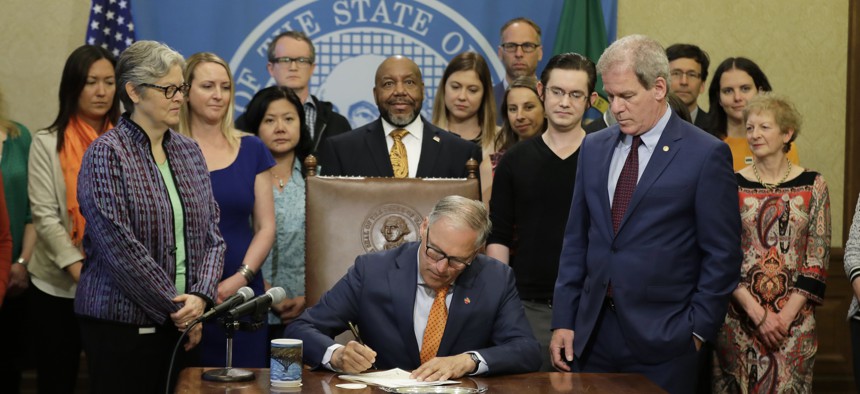Washington State Tightens Gun Regulations

Washington Gov. Jay Inslee signed gun control legislation into law this week. Ted S. Warren/AP Photo

Connecting state and local government leaders
STATE AND LOCAL ROUNDUP | States consider lowering DUI threshold … Alabama advances equal pay legislation … Illinois proposes LGBTQ curriculum.
People released from psychiatric holds in Washington state will now be temporarily barred from purchasing guns, part of a package of firearm regulations signed into law by Gov. Jay Inslee. Other bills implement a full ban on “ghost guns” made of plastic or lacking serial numbers and update gun-surrender requirements for people with restraining orders against them. Washington now has some of the strictest gun regulations in the country, according to Renee Hopkins, head of the Alliance for Gun Responsibility. “It’s taking a risk-based approach to it, and really looking at the situations that we know are highest risk,” said Hopkins. Other gun regulations have failed in the state recently, including a ban on assault weapons and high-capacity magazines. But the restrictions that did become law have Joe Waldron, a spokesman for the Gun Owners Action League of Washington, worried. “They’re just as happy expanding the list of people that can’t have guns,” Waldron said. “Piece by piece, they’re chopping away.” This week, bills banning “ghost guns” also passed the House in Connecticut and were introduced by the New York City Council. “Ghost guns” have become a particular target of legislation recently because of the proliferation of 3D printing technologies that can create untraceable plastic guns. [Washington Post; KIRO 7 Seattle; K5 News]
DRUNK DRIVING | Since the start of 2019, Utah has had the toughest anti-drunk driving standard in the country—but lawmakers now want to study whether it’s working. "We want Department of Alcoholic Beverage Control to report, we want public safety to report, we want to see how well is that policy working. Is it accomplishing what it was intended to do?" state Sen. Curt Bramble said. Bar owner David Morris says that his business has not suffered as a result of the change, but he worries that people will be punished after having a single glass of wine or beer, not knowing they are over the limit. "Have the punishment fit the crime. Maybe the compromise here is .05, .06, .07s, where it used to not be illegal, write them a warning, a citation instead of charging a misdemeanor," he said. In the past month, three other states—California, Michigan, and New York—have also introduced bills to lower the threshold in their states to .05. [FOX 13 Salt Lake City; KSL-TV]
LGBTQ HISTORY | Illinois may soon see the sexual orientation of historical figures noted in textbooks, if a bill that passed the House passes the Senate this week. Anna Moeller, the bill’s sponsor, says that including this information will be a step towards equality and a better understanding of history. “Under current practice in many of our schools, the contribution of LGBT individuals in history has remained hidden and unacknowledged,” Moeller said. But Effingham Superintendent Mark Doan is worried about the cost of finding new textbooks once the law goes into effect on the proposed date of July 1, 2020. “From the district's perspective, the Illinois legislature continually creates mandates for school districts without providing funding,” said Doan. Last week, Colorado mandated LGBTQ curriculum for K-12 public school students, and New York is considering a similar proposal. [Effingham Daily News; Reuters]
EQUAL PAY | A bill in Alabama that would legalize “equal pay for equal work” has unanimously advanced out of committee. If the bill becomes law, it would end Alabama’s status as one of only two states without such a law, leaving Mississippi alone. The bill prohibits differentiated pay on the basis of gender or race, said Rep. Adline Clarke, the bill’s sponsor. "It's a fairness issue," Clarke said. "I think that all of us in here would like for our daughters, and our granddaughters ... and all workers to get equal pay for equal work." Clarke believes most businesses are already paying their workers fairly, but this legislation would make it easier for civil suits to proceed if Alabama residents are experiencing discrimination. Clarke worked with the National Federation of Independent Business to ensure that the wage reporting requirements would not be a burden to the state’s small businesses. [Opelika Auburn News; AL.com]
WEST VIRGINIA GOVERNOR | The Department of Justice filed a civil lawsuit against 23 coal companies owned by the family of West Virginia Gov. Jim Justice. The businesses have racked up nearly 2,300 mine safety and health violations from the past five years and the suit seeks more than $4.7 million for unpaid fines. “The defendants...have, to date, refused to comply with their legal obligations to pay...financial penalties,” said U.S. Attorney Thomas Cullen. “This is unacceptable, and, as indicated by this suit, we will hold them accountable.” Mike Carey, counsel for the 23 companies, said, “The Justice family is disappointed the U.S. Attorney’s Office has decided to follow this route and file a lawsuit at this time.” [West Virginia Public Broadcasting; West Virginia Metro News]
TEACHERS | A bill on the Senate floor in North Carolina is proposing that charter schools be allowed to receive local tax dollars for building acquisition, and calls for paying bonuses to bring retired teachers back into the workforce. The legislation would allow retired teachers to get $35,000 a year, plus their normal retirement package, if they take up positions in schools graded “D” or “F” on their annual report cards. The bill would also allow local taxes to be used to buy buildings for new charter schools and fund facility improvements. State Sen. Jerry Tillman, the bill’s sponsor, says it isn’t fair to treat charter schools differently from public schools, as they both receive tax money, so any funding increase to them will inherently help local districts. [WRAL]
Emma Coleman is the assistant editor for Route Fifty.

NEXT STORY: States Move to Crack Down on Fertility Fraud





